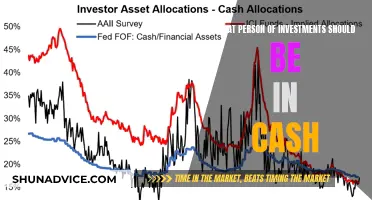
Cash alternative investments are investment types that are considered safer than holding money in a checking account. They are also known as cash equivalents or cash alternative products. Cash alternative investments are considered to be low-risk and highly liquid, and they generally pay higher interest than a checking account. They can be a good option for money that needs to be accessed quickly or for short-term goals. Examples of cash alternative investments include money market deposit accounts, certificates of deposit, and savings accounts.
| Characteristics | Values |
|---|---|
| Definition | Investment types that are alternatives to simply holding money in a checking account |
| Risk | Relatively low-risk, lower risk than bonds |
| Liquidity | Highly liquid, can be converted into cash quickly |
| Safety | Safer than stocks and bonds, shouldn't fall in value |
| Interest | Higher interest than a checking account |
| Access | Easy access |
| Diversification | Can provide diversification within a broader portfolio |
| Examples | Money market deposit accounts, certificates of deposit (CDs), savings accounts, money market accounts, money market funds, bank accounts with higher interest, bond-like investments, mutual funds |
What You'll Learn
- Cash alternatives are as safe as cash but with higher returns
- They are highly liquid and can be converted into cash quickly
- They are a good option for emergency funds or short-term savings
- Examples include money market deposit accounts and certificates of deposit
- They are lower risk than stocks and bonds

Cash alternatives are as safe as cash but with higher returns
Cash alternative investments are investment types that are considered relatively low-risk and highly liquid. They are basically as safe as cash but with higher returns. These investments are outside of traditional investments such as stocks, bonds, and cash.
Cash alternative investments are a good option for money that you might need to access quickly or that is saved for a near-term purpose. For example, you might consider them for your down payment fund if you're planning to buy in the next one to two years, or for a savings fund for a wedding, vacation, or any other short-term goal.
Some of the most common examples of cash alternative investments include money market deposit accounts and certificates of deposit (CDs). Money market accounts are very low-risk investments, though they are not insured and are not considered risk-free. CDs, meanwhile, tend to be illiquid and may result in a penalty if you withdraw early.
Other examples of cash alternative investments include savings accounts, money market funds, and a bank account that pays higher interest.
How Cash Investments Impact Owners' Equity
You may want to see also

They are highly liquid and can be converted into cash quickly
Cash alternative investments are considered highly liquid and can be converted into cash quickly. They are investment types that can be considered alternatives to simply holding money in a checking account. They are basically as safe as cash but can earn a slightly higher return than you might earn in your main bank account.
Cash alternative investments are also highly accessible, meaning that investors can get to their money quickly in case of emergencies. They are also a good option for money that you might need access to quickly or that has been earmarked for a near-term purpose. For example, you might consider a cash alternative investment for your down payment fund if you're planning to buy in the next one to two years, or for a savings fund for a wedding, vacation, or any other short-term goal.
Cash alternative investments are also a good option for investors who want to diversify their portfolios. They can be useful for investors who want to maintain a ready source of cash to pay for goods or services, such as a down payment on a home or car, a new washing machine, or a family vacation. They can also be used to meet unexpected demands on cash, such as repairing storm damage to your home or other financial emergencies.
Some of the most common examples of cash alternative investments include money market deposit accounts and certificates of deposit (CDs). While cash alternative investments are considered highly liquid, it's important to note that not all types are FDIC-insured. For example, the principal value of US Treasury bills will fluctuate with market conditions and may be higher or lower if you choose to sell before maturity.
Morris Invest: The Cash-Only Strategy Explained
You may want to see also

They are a good option for emergency funds or short-term savings
Cash alternative investments are a good option for emergency funds or short-term savings. They are considered relatively low-risk and highly liquid, meaning they can be converted into cash quickly. For example, if you need to pay for unexpected home repairs or need to access cash in a hurry, cash alternatives are a good option.
Cash alternatives are also a good choice if you are saving for a short-term goal, such as a wedding or vacation. They are generally safer than stocks or bonds and can provide a stable source of income. Additionally, cash alternatives usually pay higher interest rates than a standard checking account, so your money can grow while still being easily accessible.
Some common examples of cash alternative investments include money market deposit accounts and certificates of deposit (CDs). These options tend to be less risky than other types of investments and can provide a stable source of income.
However, it is important to remember that cash alternative investments may not offer as high of a return as riskier investments. Additionally, while some cash alternatives are FDIC-insured, others are not, so it is important to carefully consider the risks involved before investing.
Understanding Cash Flows from Investing Activities
You may want to see also

Examples include money market deposit accounts and certificates of deposit
Cash alternative investments are financial assets that do not fall into conventional investment categories such as stocks, bonds, and cash. They include private equity, venture capital, hedge funds, real estate, commodities, and derivatives contracts.
Money market deposit accounts and certificates of deposit (CDs) are also cash alternative investments. Money market accounts are a type of mutual fund that invests in short-term, interest-bearing instruments. They generate variable yields while preserving the principal amount. Money market accounts usually require higher minimum deposits and balances than traditional savings accounts, but they offer more flexibility in terms of withdrawals and payments.
CDs, on the other hand, are timed deposits that offer a fixed interest rate for a set period, usually ranging from one month to ten years. Withdrawing money from a CD before its maturity date typically incurs a penalty. However, some banks now offer no-penalty CDs, which allow for early withdrawals without interest penalties but at lower interest rates.
Both money market accounts and CDs are FDIC-insured, making them relatively safe investment options.
Capital Investment Project: Cash Flows Strategy
You may want to see also

They are lower risk than stocks and bonds
Cash alternative investments are considered lower-risk than stocks and bonds. They are also highly liquid, meaning they can be converted into cash quickly.
Cash alternative investments are a good option for money that you might need to access quickly or that is saved for a near-term purpose. For example, an emergency fund, a down payment fund, or any savings for a short-term goal.
Cash alternative investments are also a good option for investors who want to provide relative stability to their portfolio. While they can't guarantee a gain or protect you from losses, they are generally considered safer than stocks and bonds.
Some common examples of cash alternative investments include money market deposit accounts and certificates of deposit (CDs).
It's important to note that while cash alternative investments are lower risk, they also have a lower potential return compared to higher-risk investments. This is known as an opportunity cost, where you may be limiting your investment income by playing it safe.
Additionally, even though cash alternative investments are considered low-risk, they are not completely risk-free. For example, the principal value of US Treasury bills will fluctuate with market conditions, and other cash alternatives carry a higher default risk. Therefore, it's always recommended to consult a financial advisor before investing.
Apple's Cash: Where Does it Go?
You may want to see also
Frequently asked questions
Cash alternative investments are investment types that are considered relatively low-risk and highly liquid. They are alternatives to simply holding money in a checking account.
Examples of cash alternative investments include money market deposit accounts, certificates of deposit (CDs), savings accounts, money market accounts, and money market funds.
The advantages of cash alternative investments include easy access to funds, higher interest rates compared to checking accounts, and safety, as they are less likely to fall in value compared to stocks and bonds.
The disadvantages of cash alternative investments include lower potential returns compared to higher-risk investments and the possibility that earnings may not keep pace with inflation over the long term.







